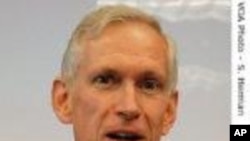At a press conference inaugurating his tenure as the thirteenth U.S. ambassador to Bangladesh, Mr. James Moriarty noted that "promoting democracy, ensuring development, and denying space to terrorism are the key challenges that Bangladesh faces." The United States, he said, "will remain a close partner to the people of Bangladesh in each of these areas."
Mr. Moriarty expressed admiration for "the achievements of the Bangladeshi people who fought for decades to win the right to govern themselves and control their own destiny."
Since winning independence from Pakistan in 1971, Bangladesh’s path to democracy has been obstructed by civil disorder and periods of military rule. In January 2007, Bangladesh’s President Iajuddin Ahmed declared a state of emergency in the face of opposition boycott of scheduled national elections and widespread political violence. In accordance with Bangladesh’s constitution, the president appointed a caretaker government that has embarked on an ambitious agenda to rid the country of endemic corruption, reform institutions necessary for sustainable democracy and hold free and transparent elections. Ambassador Moriarty said that much has been accomplished in a short period of time, but much remains to be done.
"In order to fulfill its mandate," said Mr. Moriarty, "the Caretaker Government needs the support of the public and private sectors, the international community and, most importantly, the Bangladeshi people." Even with perennial flooding, a growing population, and persistent poverty, Bangladesh has enjoyed strong economic growth over the past decade. High international commodity prices and natural disasters, however, have made life more difficult for Bangladeshis.
The United States has provided roughly five billion dollars in assistance to Bangladesh since its independence, and its annual assistance programs average one-hundred million dollars. Last year, immediately after Cyclone Sidr, the U.S. provided over nineteen million dollars in emergency assistance and support to the devastated areas.
"The people of Bangladesh have been victimized by terrorism in the recent past, and instinctively understand the evils that extremism fosters," said Ambassador Moriarty. "The U.S. will work together with Bangladesh, he said, to combat those evils. Secretary of State Condoleezza Rice said the U.S. looks forward "to increased partnership as Bangladesh takes its rightful place as a country that can help bring stability and strength to South Asia."












